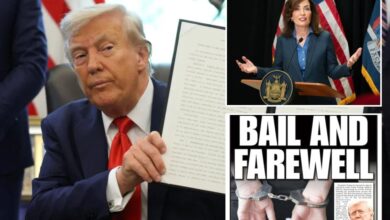Food industry lobbies for tariff exemptions on seafood, fresh produce

US food industry groups are begging for relief from President Trump’s tariffs – warning they could send prices soaring on everything from fish and shrimp to fresh produce.
Instead of pushing for overall tariffs to be revoked, these trade associations are asking for item-specific exemptions on food products that cannot be produced on a major scale in the US.
🎬 Get Free Netflix Logins
Claim your free working Netflix accounts for streaming in HD! Limited slots available for active users only.
- No subscription required
- Works on mobile, PC & smart TV
- Updated login details daily
Food products have not been a top concern when it comes to tariffs, as only about a fifth of food consumed in the US is imported, according to the US Department of Agriculture.
But for certain food products, the US leans heavily on other countries – importing about 85% of US seafood consumption, for example, Gavin Gibbons, chief strategy officer at the National Fisheries Institute, a US seafood trade group, told the Financial Times.
“There are so many voices, so many products that say, ‘Well, we just need an exemption, because we’re unlike others,’” according to Gibbons.
But seafood is “fundamentally different,” added Gibbons, who is calling for a tariff exemption on all seafood products.
American producers can’t simply boost their output to cover those imports, as US waters are already being fished at their maximum sustainable yield, he added.
About 90% of the US shrimp supply comes from imports, as well.
India accounts for over a third of these imports, and Trump is expected to hike tariffs on India to 50% on Wednesday as punishment for its oil purchases from Russia.
Imports of fruits and vegetables, meanwhile, total $36 billion, with Mexico as the largest overall supplier trailed by Peru for fruits and Canada for vegetables, according to the International Fresh Produce Association.
“We are asking for fruits and vegetables to just be out of the tariff conversation,” Rebecka Adcock, vice president of government relations at IFPA, told the Financial Times.
In a letter to US trade representative Jamieson Greer last month, the National Restaurant Association warned that menu prices would spike without tariff exemptions on fresh ingredients, since some produce is only able to be grown in the US seasonally.
“We agree that our trade deficits with other countries should be more balanced,” Sean Kennedy, an executive vice president at the association, said in the letter, “but as food and beverage products do not significantly contribute to these deficits, we are hopeful that these products can be exempt.”
Industry leaders are holding out hope for item-specific exemptions, especially after trade deals with Indonesia and the European Union carved out provisions for unavailable natural resources – though details on which specific goods could qualify were not included.
Trump also approved exclusions for orange juice and Brazil nuts earlier this month when he slapped Brazil with a 50% tariff.
The nation’s coffee beans, however, are still subject to the tax, which could send costs soaring for the US coffee industry.
Food products traded between the US, Mexico and Canada also face much lower tariffs, after Trump offered an exemption to any goods complying with a 2020 trade deal.
Without exemptions on certain food products, tariffs “will raise prices by a very noticeable amount,” said Andy Haring, vice president at the Food Industry Association (FMI), which partners with grocery stores like Walmart and Albertsons.
In a recent analysis, the FMI nodded to cucumbers as an example of these trade tensions.
The share of the US cucumber supply coming from imports has jumped from 35% in 1990 to nearly 90% today.
While the US could try to ramp up production of cucumbers, they would have to be grown in greenhouses for much of the year, which is costly and would drive up prices, the FMI said.
“There is still a desire to be able to ask for exemptions, and try to turn these tariffs into a more targeted and focused kind of approach to addressing both reshoring production in the US and supporting US jobs,” Haring told the Financial Times.
Tom Madrecki, vice president of supply chain resiliency at the Consumer Brands Association, which represents PepsiCo and JM Smucker, said that – despite the price impact – it would be foolish to “just sort of call for the complete restoration of ‘90s era free trade.”
“Philosophically, politically, that era has passed,” he told the Financial Times.
Credit to Nypost AND Peoples



